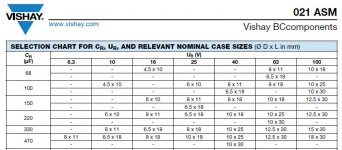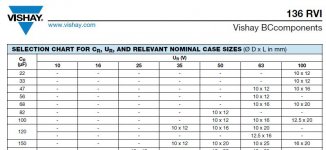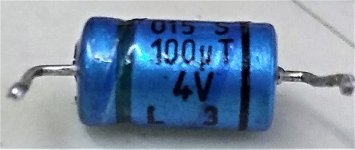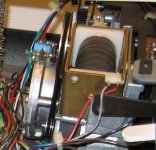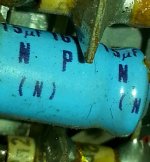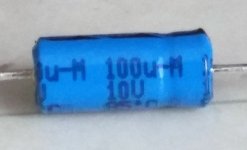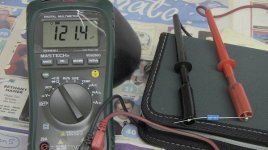A very good day to you all;
I have just finished testing all of my Blue Electrolytic Capacitors on a Philips cassette deck and I have found some with extraordinary high capacitance readings; four 100μf 4v and 10v axial caps gave 158.4μf, 247.4μf, 155.4μf and 164μf; these are much higher readings than the stamped value?
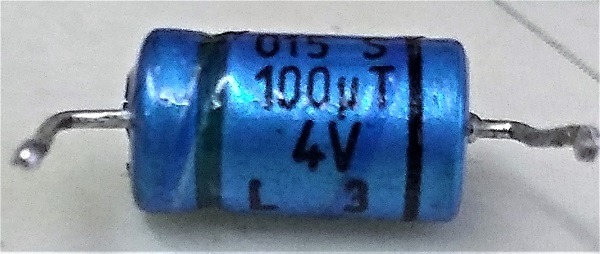
I need advice on this whether to replace them; they most probably were like this when it was built and commissioned, so with this in mind it would be best to leave them fitted?
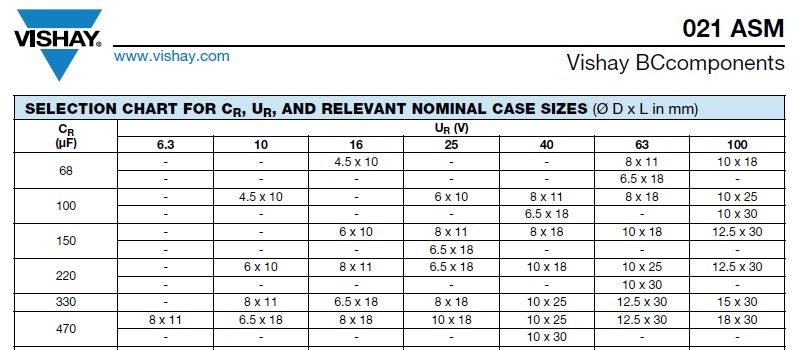
I do have a 47μf 10v redial that gives/reads 45.4μf; I intend to replace this with a Vishay 136 RVI 47μf 63volt, this is the nearest to match?
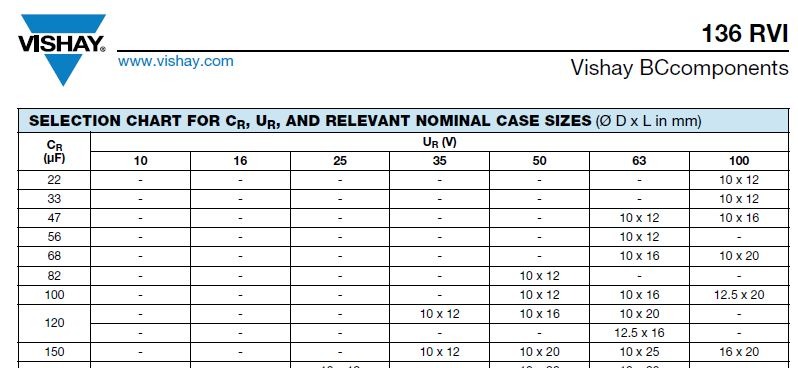
I have just finished testing all of my Blue Electrolytic Capacitors on a Philips cassette deck and I have found some with extraordinary high capacitance readings; four 100μf 4v and 10v axial caps gave 158.4μf, 247.4μf, 155.4μf and 164μf; these are much higher readings than the stamped value?
I need advice on this whether to replace them; they most probably were like this when it was built and commissioned, so with this in mind it would be best to leave them fitted?
I do have a 47μf 10v redial that gives/reads 45.4μf; I intend to replace this with a Vishay 136 RVI 47μf 63volt, this is the nearest to match?
Attachments
Last edited:
47μf 10v Redial
Thank you Jon; the 47μf 10v redial, could you be more specific, thanks
There are a good selection of values in 6v3 and 16v ranges.
Thank you Jon; the 47μf 10v redial, could you be more specific, thanks
They are not that far off, except one (which is probably leaky), in the old days electrolytic capacitor tolerance was usually +80%/-30% ... most of yours are in that range.
And, what is the actual problem you are trying to correct?
If any, what makes you think those capacitors are the cause?
Like experienced Jon Snell says, I wouldn´t mess with them unless having a good cause to do so.
And, what is the actual problem you are trying to correct?
If any, what makes you think those capacitors are the cause?
Like experienced Jon Snell says, I wouldn´t mess with them unless having a good cause to do so.
The Sound Quality Goes Down
Thank you; that does suggest replacement's.
The sound quality goes down as if the tape heads were dirty.
I was told that the tape heads were long lasting and would't be the issue, it was likely to be the Electrolytic Capacitors (Elco's)
I agree; and then Jon kindly provided a link for acquiring replacements and you have suggested one is leaking.

I have this pretty well stripped down now; so I want to make a job of it whilst it is easy to work on
They are not that far off, except one (which is probably leaky), in the old days electrolytic capacitor tolerance was usually +80%/-30% ... most of yours are in that range.
Thank you; that does suggest replacement's.
And, what is the actual problem you are trying to correct?
The sound quality goes down as if the tape heads were dirty.
If any, what makes you think those capacitors are the cause?
I was told that the tape heads were long lasting and would't be the issue, it was likely to be the Electrolytic Capacitors (Elco's)
Like experienced Jon Snell says, I wouldn´t mess with them unless having a good cause to do so.
I agree; and then Jon kindly provided a link for acquiring replacements and you have suggested one is leaking.
I have this pretty well stripped down now; so I want to make a job of it whilst it is easy to work on
Attachments
These old blue Philips axials are pretty crappy. I've got a few floating around that I bought new maybe 15 years ago and never used, and they're leaky.
Very high capacitance readings like that do in fact usually suggest parts that are way past their usable life; you'll probably find that their ESR is through the roof.
You can virtually always go with a somewhat higher voltage rating assuming physical size is not an issue - as caps have gotten a fair bit smaller in the last few decades, you'll often find something 1 or 2 steps up that's the same size. Getting axials is a bit of a hassle these days, you can still get some from companies few have ever heard of and they seem to work, but quality wise, no idea.
You can often hack radials in there (which means a large choice of known good-quality caps), just avoid putting stress on the cap legs where they enter the body and always bend them some distance away.
Very high capacitance readings like that do in fact usually suggest parts that are way past their usable life; you'll probably find that their ESR is through the roof.
You can virtually always go with a somewhat higher voltage rating assuming physical size is not an issue - as caps have gotten a fair bit smaller in the last few decades, you'll often find something 1 or 2 steps up that's the same size. Getting axials is a bit of a hassle these days, you can still get some from companies few have ever heard of and they seem to work, but quality wise, no idea.
You can often hack radials in there (which means a large choice of known good-quality caps), just avoid putting stress on the cap legs where they enter the body and always bend them some distance away.
It's Good To Know
Did Philips capacitors get taken over by another company or Philips just stopped making them for their own purpose?
After measuring some spare new ones; the readings were not much above there stamped value, which got me thinking, failure maybe isn't just low readings and could be also high readings!
I have managed to order replacements from Farnell and CPC; I wanted Vishay 021 AMS series, but had to accept some 030 AS series, I am trying to keep some uniformity in this job, thank you for your input.
These old blue Philips axials are pretty crappy. I've got a few floating around that I bought new maybe 15 years ago and never used, and they're leaky.
Did Philips capacitors get taken over by another company or Philips just stopped making them for their own purpose?
Very high capacitance readings like that do in fact usually suggest parts that are way past their usable life; you'll probably find that their ESR is through the roof.
After measuring some spare new ones; the readings were not much above there stamped value, which got me thinking, failure maybe isn't just low readings and could be also high readings!
You can often hack radials in there (which means a large choice of known good-quality caps), just avoid putting stress on the cap legs where they enter the body and always bend them some distance away.
I have managed to order replacements from Farnell and CPC; I wanted Vishay 021 AMS series, but had to accept some 030 AS series, I am trying to keep some uniformity in this job, thank you for your input.
Last edited:
Capstan Motor Bipolar “NP” electrolytic capacitor 15μf 16v redial
On a Philips cassette deck there is a Capstan Motor; with a bipolar type “NP” electrolytic capacitor 15μf 16v redial fitted.
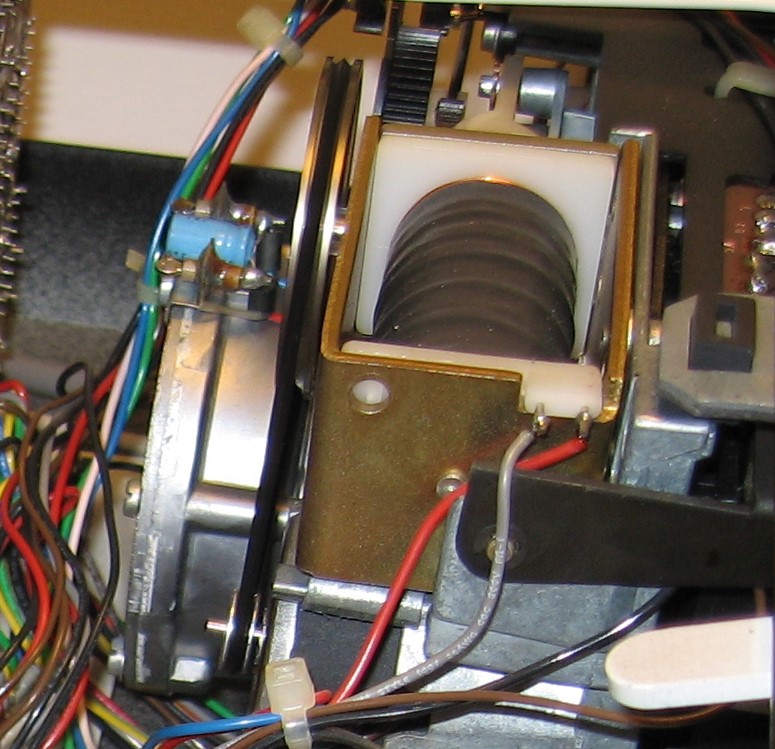
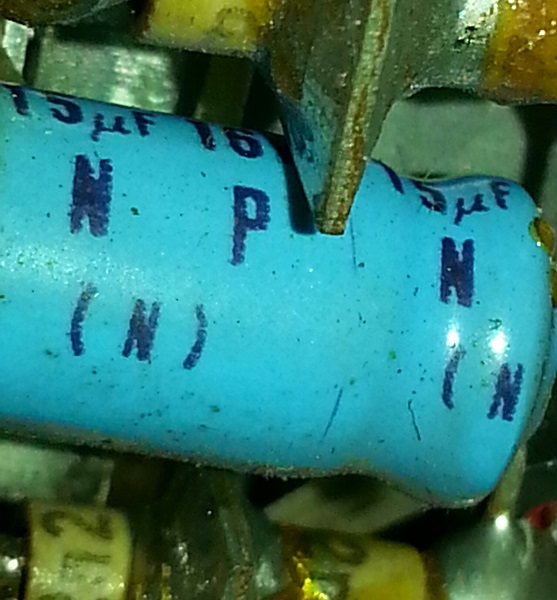
I was thinking about replacing this cap; however looking on eBay, finding a 15μf cap has proved to be a challenge
I haven’t remover and tested because it is heavily/well soldered and likely to cause damage to the cap
On a Philips cassette deck there is a Capstan Motor; with a bipolar type “NP” electrolytic capacitor 15μf 16v redial fitted.
I was thinking about replacing this cap; however looking on eBay, finding a 15μf cap has proved to be a challenge
I haven’t remover and tested because it is heavily/well soldered and likely to cause damage to the cap
Attachments
Becoming More Clearer
Thank you Glenn for that; could I kindly ask for your thoughts on this, the higher 22μf cap to gain more understanding, thanks?
A very good day to you all and thank you for your valuable comments, well appreciated; it has become clearer now.

Electrolytic Capacitors (cap) have a life span of around 1000 hrs; with this in mind, the higher readings are most likely acquired because of leakage from the old cap, as some suggests.
With this in mind; it would make sense to replace them all, whilst the job is in hand. Below you can see the new cap and it’s capacitance reading.
Go up to 22uF. Higher voltage rating would also be OK.
Thank you Glenn for that; could I kindly ask for your thoughts on this, the higher 22μf cap to gain more understanding, thanks?
A very good day to you all and thank you for your valuable comments, well appreciated; it has become clearer now.
Electrolytic Capacitors (cap) have a life span of around 1000 hrs; with this in mind, the higher readings are most likely acquired because of leakage from the old cap, as some suggests.
With this in mind; it would make sense to replace them all, whilst the job is in hand. Below you can see the new cap and it’s capacitance reading.
Attachments
"Electrolytic Capacitors (cap) have a life span of around 1000 hrs ..."
Please think about that! If true then all elkos would need replacing 3 or times a year in ALL of your electronic equipment!
I bought this new in the early 1980's; it's the first time around for renewing the elkos.
I replaced many elkos in an amplifier; which really improved the sound quality, about 4 years ago of the same age, this impressed me to continue and do the same in this unit.
If you look carefully it says 1000 hours at 85C. Run it cooler and it will last longer. Also, this is what the datasheet says; it is probably a minimum spec so most production caps will last longer than this. It is also probably a 'running' spec, so hours switched off don't count. Take this all together and you find that a cool electrolytic can last many years. 10, 20, 30 years are possible in a non-critical circuit position in domestic audio.
- Status
- This old topic is closed. If you want to reopen this topic, contact a moderator using the "Report Post" button.
- Home
- Design & Build
- Parts
- Electrolytic Capacitors With Higher Stamped Value
